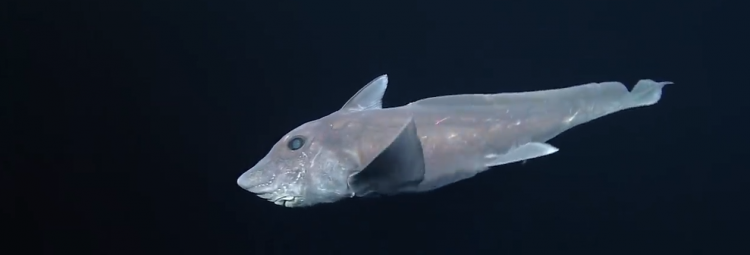New Zealand scientists have discovered a newly hatched ghost shark, which they believe will help them better understand the "mysterious" animal.
The ghost shark was discovered on the Chatham Rise, a region of ocean floor off the east coast of the South Island, at a depth of roughly 1,200 meters (about 3,900 ft).
The "very rare" discovery was uncovered during a recent survey, according to a news release issued by the National Institute of Water and Atmospheric Research (NIWA) on Tuesday.
The alien-like baby, which is translucent, gelatinous, and has a pair of large black eyes on its pointed head, is most likely one of the more than 50 known species of ghost sharks, also known as chimaeras, that reside in deep water around the world.
Despite not being sharks, chimaeras are closely related to both sharks and rays, all of which are fish having cartilage skeletons rather than bone, according to NIWA.
During a recent NIWA trawling survey to estimate the population of another local fish, the hoki, the newly hatched, or neonate, chimaera ended up in the net (which is commonly used in commercial fish products).
They are cartilaginous fish, meaning their skeletons are mostly comprised of cartilage, and their embryos develop in egg capsules buried on the sea floor, feeding on egg yolk until they hatch.
Brit Finucci, a fisheries scientist who was part of the team that made the discovery, said in the press release that the ghost shark was identifiable as being newly hatched because its belly was still full of egg yolk.
"We don't actually know a lot about ghost sharks," Finucci told CNN Thursday. "What we do know mostly comes from adult specimens. So it's very rare and very uncommon to find juveniles of a lot of these species, so that's why I got quite excited."
Finucci went on to say that because most ghost sharks live in deep water, they are "very difficult to get to," and she hoped the new discovery will help us complete some "biology gaps."
The specific type of ghost shark discovered by the scientists is unknown, and Finucci stated that new species of ghost shark are continually being discovered, and that measurements and DNA samples would now be obtained for identification purposes.
Because of the specimen's age, researchers will be able to compare it to what they know about adult ghost sharks, accounting for variations in habitat, nutrition, and appearance that Finucci says can occur between juveniles and adults.






